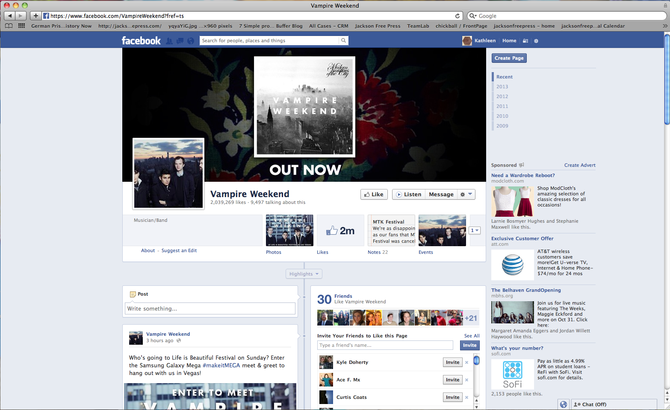The term "fan" is actually a bit more dramatic than its three letters let on. To say, "I'm a fan of foreign films," sounds less insane than, "I'm a fanatic for foreign films." While the root remains the same, we've lessened the intensity, and that's probably a good thing. It's easier than labeling fans as "a bunch of people that like our music." However, even "fan" has had some of the wind removed from its sails in recent years.
I'm probably not sharing any new information when I say this whole Internet thing isn't going away. Once, the amount of time a band spent hitting the road in a beat-up van while fighting sleepless nights and gas-station food malnutrition built or broke fan bases. Now, online presence is everything.
While live performances are still important—bands build credibility through which major acts they've played with and where—they can start to feel more like resume-building material for record-label executives: "I see here you've opened for Tokyo Police Club. Are you familiar with spreadsheets?"
Beyond that, the music industry must look to almighty social media to judge whether an artist's fan base is advanced enough to risk the label's ever-important attention. Now, if you ask around, you'll hear "magic numbers" all over the place. "You need 1,000 'likes' on Facebook or 2,000 followers on Twitter or 500 people reading your blog." But it's not that simple. Labels don't just look at how many social-media fans you have. They estimate how many you could have.
With all that, you can see why bands find it so important to consistently post tour photos, upload on-the-road videos and update you on the minutiae of life as "Band A." So why do so many bands still fail? In some cases, it might be an inability to perform the daily duties of maintaining an online presence. However, other bands excel at media upkeep, yet see their popularity still dwindle.
Sadly, that's because the same system that boosts some musicians to stardom can sink others into black-hole obscurity, and it all circles back to the crucial misrepresentation of what a fan really is.
Put simply, one "like" does not equal one fan. If you need proof, look back to the dawn of time, when MySpace ruled the Web. It had charts, festivals and even a record label to make use of the soaring number of online inhabitants. But when MySpace died, people moved on to Facebook and Twitter, both of which will no doubt see a similar fate one day. The problem for some "successful" musicians was that their multitude of MySpace fans didn't cross the Great Website Divide with them.
As with TV ratings and box-office figures, numbers rarely tell the whole story. In a thousand "likes," there could potentially be only a few hundred true fans—people that will buy every album without fail and proudly sport band merch like a bronze star.
So, if that's true, then why does the music industry have such an obsession with online presence? You've probably heard the adage, "They can't see the forest for the trees." Well, for those in music, that idiom plays out in reverse. We look at these immense numbers and say, "Wow, Vampire Weekend has 226,621 fans," but seldom do we grasp that each tally is a functioning person with a different level of relationship with the artist.
The crazy misconception is that fans just want videos or newsletters or to know what the lead singer had for dinner, but we're not as needy as all that. In truth, we want connection. It's why we'll stand in line for an hour for an autograph without batting an eye. There is something so gratifying about forming a bond with the songwriters that captivate us. And ultimately, it's that bond that separates the followers from the fans.



Comments
Use the comment form below to begin a discussion about this content.